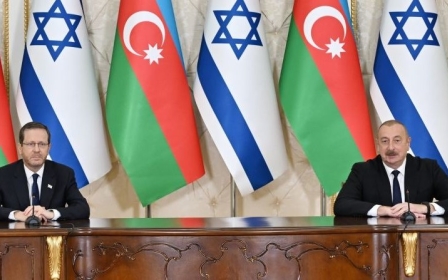Israel government proposes ‘Jewish state’ loyalty oath for diplomats

The Israeli Foreign Minister Eli Cohen circulated a memorandum on Tuesday evening that would require the head of diplomatic or consular missions to make an additional declaration of allegiance.
Before being handed a letter of appointment to their respective posts, the senior diplomats would need to pledge "to maintain allegiance to the State of Israel as a Jewish and democratic state".
The rationale behind the latest proposal, according to the memorandum, is that the “head of a diplomatic or consular mission is the official and senior representative of the sovereign in the foreign country” and has a duty to “faithfully express the government's policy both in foreign relations and in domestic policy".
But some have criticised the move as “shameful” and say it blurs the lines between the elected government of the day and those representing the state itself.
In a tweet one critic said that the Israeli government did not understand the difference between a government and a state, and were in effect demanding officials "faithfully express” the views of Israeli Prime Minister Benjamin Netanyahu.
New MEE newsletter: Jerusalem Dispatch
Sign up to get the latest insights and analysis on Israel-Palestine, alongside Turkey Unpacked and other MEE newsletters
Yonatan Touval, an analyst at the Israeli Institute for Regional Foreign Policies mocked the latest proposal, sarcastically suggesting that Israeli President Isaac Herzog, who is currently in Baku, demand that George Deek, the ambassador of Israel to Azerbaijan and a Christian Palestinian citizen of Israel, prove his loyalty by taking the oath.
The new far-right Israeli government has launched various proposals that seek to emphasise the Jewish character of Israel over its democratic character through various loyalty tests.
Earlier this year, the government started the process of approving legislation allowing it to revoke the citizenship or residency of those who have committed “acts of terror” and deport them to the occupied West Bank and the Gaza Strip.
The Knesset has already passed the first reading of a bill that stipulates that those sent to prison for offences that breach “trust to the State of Israel” and have received a form of funding from the Palestinian Authority can have their citizenship or residency revoked and be deported.
Loyalty test
This is not the first time that the loyalty of citizens of non-Jewish descent has been deemed controversial in Israel.
“In 2008, Israeli law was amended to allow the minister of interior to revoke citizenship based on loyalty, or the perceived lack of,” Hassan Ben Imran, a Nairobi-based board member at Law for Palestine, told MEE earlier this year.
In 2010, the Israeli government approved a bill requiring new non-Jewish citizens to swear an oath of allegiance to Israel as a "Jewish and democratic state".
The Israeli oath of allegiance, commonly known as the "Loyalty Oath," has for some time been a subject of controversy and debate within Israel due to its potential discriminatory implications for non-Jewish citizens of the country.
The amendment in 2010 aimed to reinforce the Jewish character of Israel but critics viewed it as discriminatory and exclusionary towards non-Jewish citizens and immigrants, particularly the Palestinian minority, who make up 20 percent of the country’s population.
Critics have warned that by placing a greater emphasis on Jewish identity, such loyalty proposals potentially undermine the equal rights and status of non-Jewish citizens.
Opponents of the oath argue that it undermines principles of equality and freedom of expression by forcing individuals to declare loyalty to a specific definition of the state's character.
Middle East Eye delivers independent and unrivalled coverage and analysis of the Middle East, North Africa and beyond. To learn more about republishing this content and the associated fees, please fill out this form. More about MEE can be found here.





